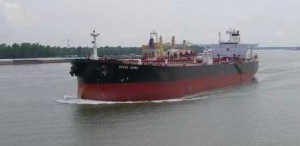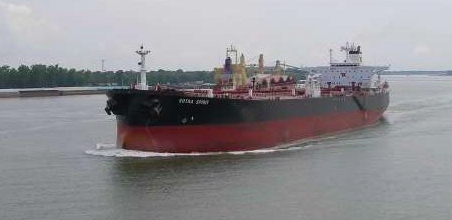By Libya Herald reporters.

Tripoli, 30 April 2016:
The Thinni government’s attempt to sell oil on its own account ended today when the . . .[restrict]Indian tanker that had lifted the cargo began discharging it in Zawia.
The Distya Ameya, arrived in Zawia yesterday. It had taken on 650,000 barrels crude in Tobruk on Monday followed in the wake of the tanker Morning Glory, with which Petrol Facilities Guard commander Ibrahim Jadhran had sought to sell a cargo of oil in March 2014. After this tanker was intercepted by the US navy, it too came to Zawia. The Distya Ameya had sailed from Tobruk’s Hariga export terminal to Maltese waters when it held position while the international row raged over its cargo. There was never any question that it could discharge in Malta since the islands have no refinery.
The United Nations Security Council blacklisted the Distya Ameya on an application from the National Oil Corporation in Tripoli. This was backed by Libya’s UN envy Ibrahim Dabbashi, who was thereupon yesterday fired for a second time by the government of Abdullah Thinni.
The government, appointed by the internationally-recognised House of Representatives, established a rival NOC alongside it in Beida headed by Nagi Elmagrabi. For the last six months there have been moves to establish a separate NOC bank account in the UAE. It is unclear where the Beida NOC intended to channel the sale proceeds of the Indian tanker’s cargo. Last December it was reported to have signed a deal to supply Egypt with 2 million barrels of crude. It is not thought that any deliveries have yet been made.
Historically NOC’s earnings have been paid into an account of the Libyan Central Bank held in the Libyan Arab Foreign Bank’s Naples branch.
Tripoli NOC boss Mustafa Sanalla today said that the fate of the Distya Ameya should be a clear warning to all shipping companies and oil traders that only his NOC had the legal right to sell oil and anyone else attempting this would be stopped.
He warned that those behind this attempt to export crude were in danger of splitting the country.
“Let us be clear, that is what is at stake” he said, “I believe in the unity of Libya. As one nation we need to agree that our oil should not be divided at this stage of our political evolution, because this will lead to the country itself being divided”
Sanalla bemoaned the lack of clarity over NOC in the Libyan Political Agreement, saying that perhaps NOC should have been at the heart of the deal.
It is still unclear what persuaded the master or owner of the Distya Ameya to give up the attempt to sail on with its cargo. Nor has it yet been established who the beneficial owners of the crude were supposed to be. [/restrict]










